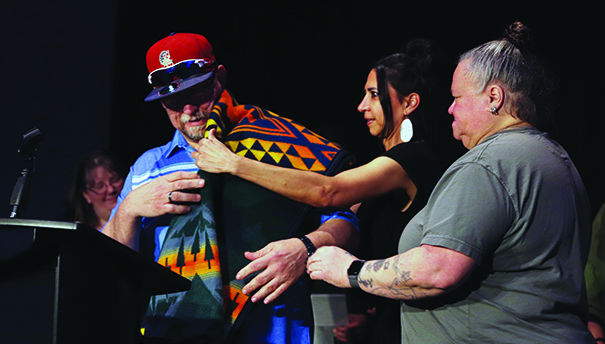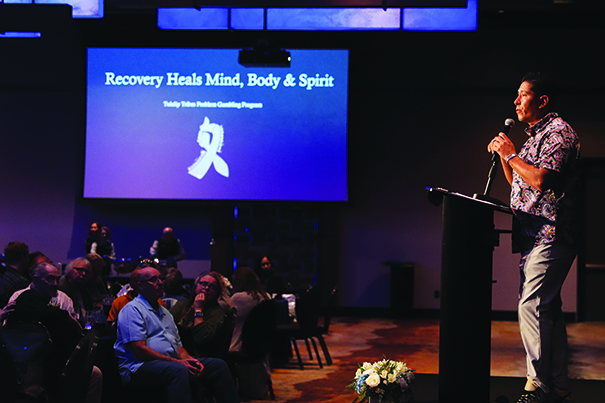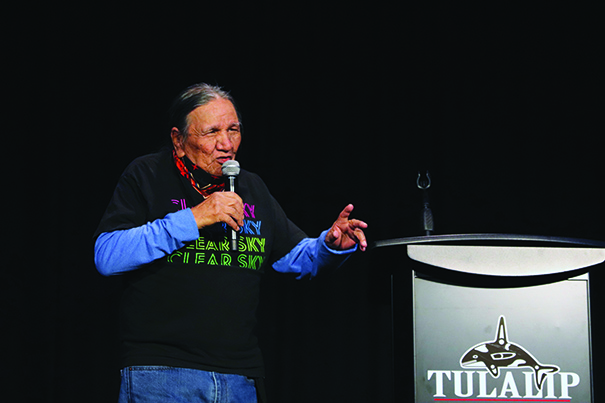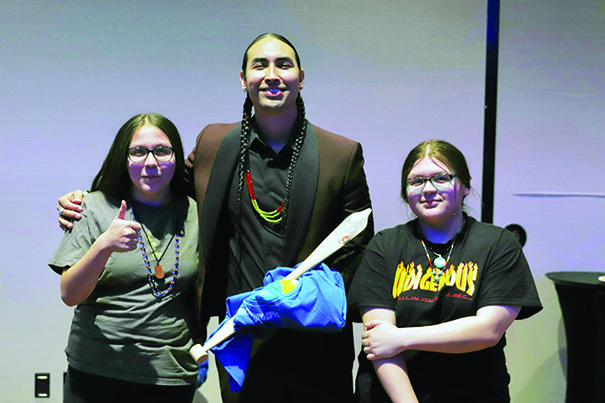
By Kalvin Valdillez, Tulalip News
It was a fantastic soiree on Saturday March 24, as over 100 people gathered at the Orca Ballroom of the Tulalip Resort Casino for a night of healing through comedic relief. Held once a year in observance of National Problem Gambling Awareness Month, this dinner is organized to not only bring attention to the prevalence of gambling addiction on the reservation and its surrounding municipalities, but also to build up the local recovery community and celebrate them for overcoming numerous plights while on their journey to a gambling and/or substance free lifestyle.
For the past decade, the Tulalip Problem Gambling program has actively participated in a nationwide initiative known as National Problem Gambling Awareness month. Occurring every March, during the season of bracket clashing known as March Madness, the Problem Gambling Program raises awareness about the compulsive gambling disease by hosting fun, engaging, informative, and impactful gatherings in the community all throughout the awareness month.
The dangerous and often silent habit affects the Native American community at a much higher rate than other ethnicities. A 2019 study by the National Institute on Alcohol and Related Conditions showed that 2.3% of the Indigenous population in America are battling a gambling addiction. Which is at an alarming rate, considering other ethnicities experience compulsive gambling at an average of 1% of their respective populations. Although that statistic is five years old, it is the most current and up-to-date research, however, many sources expect to see a major increase in that number following the global pandemic.

In years past, the Tulalip Problem Gambling program brought in Native stars for their annual get together and featured the likes of comedians Toni Jo Hall, Mitch Factor, and Kasey ‘Rezzalicious’ Nicholson, as well as Grammy Award winner, Star Nayea. This year, Kasey Nicholson returned and was on MC duties for the afternoon.
Rezzalicious shared, “Strive to become better than you were yesterday. That’s something I always try to do because I know that I’m going to fail. I’m going to continue to fall. But each time I get up, I’m going to be stronger, more resilient. Each time I get up, I’m going to look at that scar and know I went through that hard time. I have the scar, this healing to show it didn’t disable me, it empowered me to become better. So keep going. No matter how many times you fail. If you want to recover from problem gambling, keep going. It’s going to get easier; you’re going to make it. All the support that we have here today is beautiful.”
Native Comedian and Actor, Tatanka Means, of Reservation Dogs, Echo, and Killers of the Flower Moon fame, was this year’s headliner for the Problem Gambling Awareness dinner. Following a blessing from Tulalip tribal member, Natosha Gobin, Tatanka took the stage and had the crowd in stiches by combining his art of storytelling and Native humor. He also announced that he has two Netflix shows on the horizon including Native horror flick, The Windigo, as well as Ark: The Animated Series.
The night before the dinner, Tatanka spent some time with the Tulalip Youth Council at the Hibulb Cultural Center. Many members of the youth council attended the Problem Gambling Awareness dinner to watch Tatanka’s stand up and also show support to the recovery community.
Said Youth Council member, Faith Valencia, “Last night we honored the Tulalip Youth Council and welcomed Tatanka to Tulalip for the first time. We got to ask him some questions and we played a game together. It was really nice seeing him on stage today, he’s a really cool person and really funny too. It was important for us to come show our support and let everyone know that the youth is listening and watching them. It’s not just the adults who are proud of them, it’s the kids watching them and seeing ‘oh yeah, maybe my uncle can recover’ or ‘maybe I can get them into a group’.”
Two individuals who had a successful experience with the Tulalip Problem Gambling took to the stage to share their stories, including local community member Scott, who is non-tribal, and Matthew Warbonnet of the Oglala Sioux Nation.

Scott stated, ““I started gambling in casinos as soon as I turned 18. I lost a lot while gambling. Not just money. I lost my family, my soul, my health, my friendships, my marriage. In 2020 I started gambling on a really high level. I was gambling about $500 almost every single day. In 2021, I was diagnosed with lymphoma. I got a severance back-pay check and I gambled away every single penny in less than five months. Later on that year, I was awarded 100% social security disability. It took me less than a month to go through $28,000 and I didn’t have a thing to show for it. My wife told me I had a problem, and it was time for me to face my fears and to address my issues. She called Sarah Sense Wilson at the Tulalip Problem Gambling program, and I had an evaluation. On February 18, 2023, I went to my first GA meeting.”
He went on to thank each person who helped him through his time of struggle, including many people facing similar tribulations who he met through the Problem Gambling program.
Scott is now 13 months sober from gambling addiction, thanks to a personalized plan that the Problem Gambling program put together on his behalf. Upon teaming up with of handful of others in the recovery community, Scott helped organize the first Gamblers Anonymous meeting on the Tulalip reservation in over 15 years. And with assistance from the Problem Gambling Program and the Tulalip Recovery Resource Center, they have continued hosting weekly GA meetings every Thursday at noon. This is a big accomplishment and is well needed for locals to learn and share about their experience with the gambling disease, in a safe and welcoming environment.
Matthew, an Indian boarding school survivor, spoke about how the Tulalip Problem Gambling program has helped him navigate his trauma, that resulted in problem gambling. The years he endured at the St. Francis Indian School in South Dakota – a Catholic institution where students were subjected to a multitude of mental and physical abuses throughout their duration at the school were traumatic.
“You might say that I’m an addict from the treatment they gave us at the boarding schools,” Matthew expressed. “I want to tell you that I’m proud of myself for seeking this help. It’s not an easy thing to ask for that help. I want to thank the Tulalip Tribes and the Problem Gambling program. We have these struggles, we have this sorrow, we have this pain, but there’s one thing I do know, I could always count on the Native community wherever I was. There’s a shared family, love, and acknowledgement of who we are.
“The help is there for the taking and asking. And if you know anybody who needs that help, please let them know where we got our help. I’m not ashamed to say that I have a problem with gambling. I’m not ashamed to say that I needed help and I asked for it. And I will continue to ask for that help, and I encourage everybody to do that.”
Natosha returned to the stage to share a traditional Tulalip story in Lushootseed. Utilizing the call and response technique, Natosha told the story of Lady Louse, and had the entire ballroom speaking her ancestral language as they shared the story together, line for line. Leaving each person to interpret what the story means to them, Natosha stated, “Sometimes we all feel alone, even when we’re surrounded by a bunch of people who love us. We need to try to find compassion for each other. If you see someone who needs it, give them a hug, and say hello, because you can be that person to take them out of that space.”
The evening concluded with what has now become a yearly tradition at the Problem Gambling Awareness dinner – the recovery countdown. Rezzalicious started the countdown at 50 years clean and asked each person in recovery to stand when he called the amount years they have attained their sobriety goal. More than half the room was standing by the time he reached one month clean, an inspiring and beautiful sight to see.

The Problem Gambling Awareness Month dinner was once again a hit for the community of Tulalip. Due to Tatanka’s busy schedule, the event time was changed from its original start time of 6:00 pm to 1:00 pm during the week leading up to the dinner. However, many people still showed up to support and uplift those individuals working to overcome their addiction.
“I thought today was overwhelmingly successful given the changes that were made last minute with our earlier time,” said Tulalip Problem Gambling Program Coordinator, Sarah Sense Wilson. “I think that the keynote was hilarious. He’s a big headliner and people came out to see him. And that was great because they got to learn throughout our presentation about gambling addiction.”
She continued, “It was especially nice to have Matthew Warbonnet share his experience and about his gambling addiction. And our GA presenter shared that they had a year in recovery, and that they’re also part of our program. The special time devoted to recognizing the Tulalip Recovery Resource Center, I thought that was really important because they sponsor and host the GA meetings. Our community deserves to have a recovery support program too, not just treatment. It was wonderful to see the multigenerational attendance and that people laughed, enjoyed themselves, ate good food. And that’s what we wanted most, people to come together, share, laugh, and have a good time.”
If you or someone you love is dealing with a gambling addiction, or if you would like to find out more information about the Problem Gambling program, please contact (360) 716-4304.
_________________________________________
Problem Gambling Awareness
By Sarah Sense Wilson
Informed decisions make you a winner. Healthy choices ensure your wellbeing and strengthens your family and community. Our future depends on the choices you make today.
Types of Gambling
- Video Game Betting/Skins or Treasure Troves
- Slahal/Stick games
- Sports Betting
- Bingo
- Scratch Tickets
- 50/50
- Dice
- Internet Gambling
- Raffles
Gambling Facts
- Our Problem Gambling Program is about reclaiming health, wellness, and relationships.
- Tulalip Problem Gambling Program is free treatment, referrals, counseling, groups, and family therapy.
- Tulalip Tribes Problem Gambling Program is comprehensive, culturally responsive and designed to be tailored for each person seeking support.
- Problem Gambling is also referred to as Gambling Disorder, Compulsive Gambling, Addictive Gambling, and Pathological Gambling, or People experiencing Gambling Problems.
- Data: 1-3% of Washingtonians are classified as Problem Gamblers.
- We could fill the Seahawks Stadium (Lumen Field) to capacity 4x to fit all problem gamblers in our state.
- Up to 92% of problem gamblers experience suicidal ideation, and up to 40% attempt suicide.
- Sadly, only one 1-in-10 problem gamblers seek professional help.
Problem Gambling Help: Helpline 1-800-547-6133